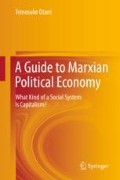Abstract
If the value of labour-power is a given, any extension of the working day will extend the surplus labour time, and hence surplus-value. The primary method that capital seeks to augment surplus-value is extending the working day. The upper-limit to the length of the working day is determined by the physical and social limitations to labour-power. Capitalists take the most minimalist view of these restrictions in attempting to extend the working day as much as possible. Workers, as the sellers of labour-power, attempt to restrict the working day to a range that allows for a normal life. Historically, capitalists at first used state power to extend the working day, but with the industrial revolution the extreme working hours led to the physical and mental deterioration of workers and early deaths, resulting in a fierce struggle by the working class to limit the working day, so that by the middle of the nineteenth century legal limits were placed on the working day in many spheres of production.
Notes
- 1.
In Marx’s English report to the Working Men’s International Association (Marx 1865), quoted from earlier, he also states: «Time is the room of human development. A man who has no free time to dispose of, whose whole lifetime, apart from the mere physical interruptions by sleep, meals, and so forth, is absorbed by his labour for the capitalist, is less than a beast of burden. He is a mere machine for producing Foreign Wealth, broken in body and brutalised in mind» (Marx 1985, p. 142: my emphasis).
- 2.
If any number of capitalists extend the working day, they are able to increase not only their absolute surplus-value but also their share of the market by selling their commodities somewhat cheaper. In that case, the rest of capitalists cannot sit idly by and must also make an effort to extend the working day, because otherwise they would be defeated in the competition between capitalists. Here we can see the law of capital striving inevitably to maximise the working day to increase absolute surplus-value, which holds whether a capitalist likes it or not as the driving motive of his operations and is exercised through the pressure of competition among capitalists. In 7 Sect. 5.1 and then in 7 Sect. 16.1 of Part III we shall again see how competition is the force that realises the imminent laws of capitalist production.
References
Marx K (1865) Lohn, Preis und Profit. English edition: Marx K (1985) Value, price and profit. Marx-Engels Collected Works. Vol. 20. Progress Publishers et al. New York
Marx K (1872) Das Kapital. Kritik der politischen Oekonomie. Bd. 1. Buch 1: Der Produktionsprocess des Kapitals. 2. verb. Aufl. Hamburg. English edition: Marx K (1976) Capital. A critique of political economy. Vol. 1 (trans: Howkes B). Penguin Books
Author information
Authors and Affiliations
Rights and permissions
Copyright information
© 2018 Springer International Publishing AG
About this chapter
Cite this chapter
Otani, T. (2018). Extension and Shortening of Working Day. In: A Guide to Marxian Political Economy. Springer, Cham. https://doi.org/10.1007/978-3-319-65954-1_4
Download citation
DOI: https://doi.org/10.1007/978-3-319-65954-1_4
Published:
Publisher Name: Springer, Cham
Print ISBN: 978-3-319-65953-4
Online ISBN: 978-3-319-65954-1
eBook Packages: Economics and FinanceEconomics and Finance (R0)

